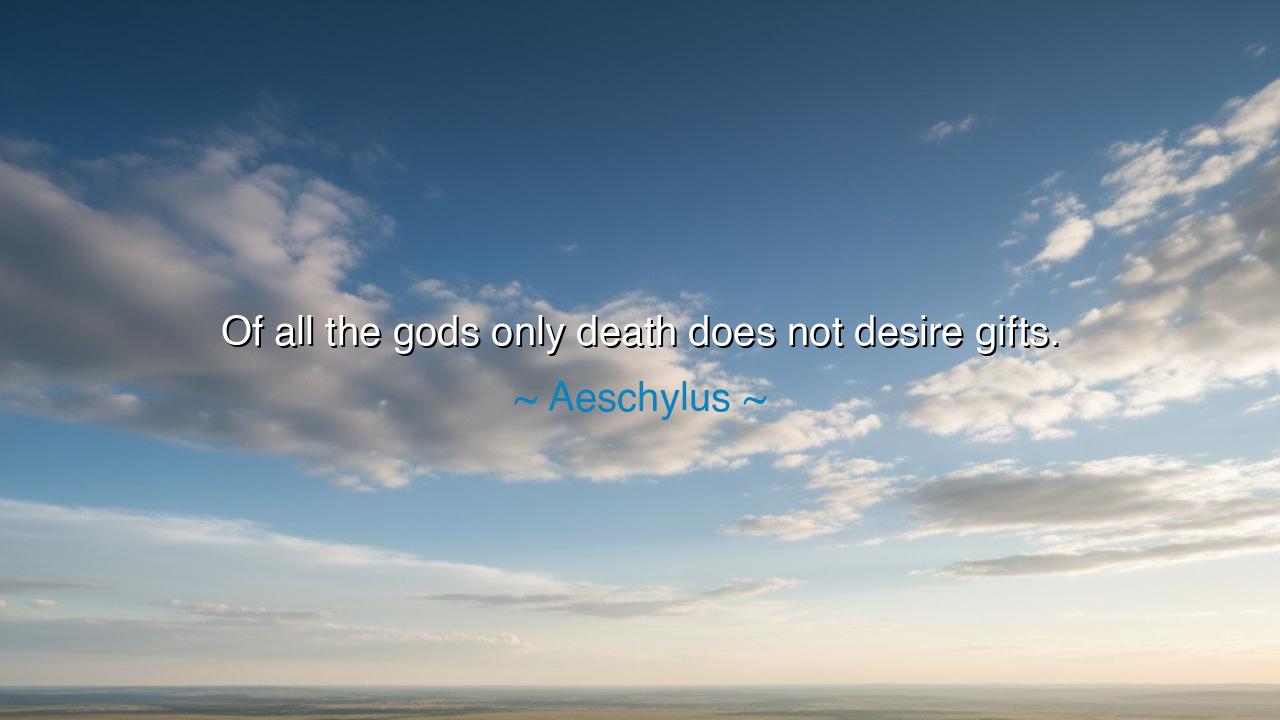
Of all the gods only death does not desire gifts.






The ancient playwright Aeschylus, father of Greek tragedy, once declared: “Of all the gods only death does not desire gifts.” In these haunting words, he speaks not only to the people of his time, but to every soul that has ever trembled at the mystery of mortality. For in the world of the ancients, the gods were hungry for offerings — for sacrifices of grain, of wine, of flesh, or of praise. Yet Aeschylus reminds us that there is one god who cannot be bribed, persuaded, or delayed: Death. He stands apart from all others — cold, impartial, unyielding — and in that very impartiality, there lies both terror and truth.
To the Greeks, the divine realm was filled with desire. Zeus craved power, Aphrodite longed for love, Poseidon demanded tribute from the seas. Every god could be appeased or angered, pleased or bribed. But Death, the silent god of endings, cared for none of these things. He accepts no gold, no incense, no prayer. He cannot be moved by song or sacrifice, for he has no hunger. He comes when he will, and none can resist him. In this sense, Death is not the cruelest of the gods, but the most just. He treats all alike — king and beggar, soldier and child, wise man and fool — for in his realm, there is no distinction, no envy, no greed. He alone is free from desire, and therefore free from corruption.
Aeschylus, who had seen war and bloodshed, understood this better than most. As a soldier in the Persian Wars, he had watched men fall beside him, their offerings and prayers unanswered. He knew that Death asks nothing because he takes all. His wisdom came not from philosophy, but from the battlefield — from watching the mightiest warriors fall silent beneath the same sky that watched over the poor. In those moments, he saw that the gods of fortune and fame were fickle, but Death was steady, unmoved, and absolute. Thus, he gave to the world this line: a truth carved in stone and shadow alike — that of all powers, Death alone is beyond the reach of bargaining.
To understand this saying is to glimpse the paradox of life itself. Every living thing seeks to please or to gain, to trade and to build, to give and to receive. We offer our labor to our masters, our love to our families, our prayers to our gods. But Death requires none of these, for he is not in the business of transaction. He is not evil, nor is he merciful — he is simply inevitable. His indifference humbles the proud and frees the wise. When we realize that no gift can stay his hand, we are forced to turn inward and ask: What, then, shall I do with the life that remains to me? For if Death cannot be bargained with, then every breath becomes sacred, every act meaningful, and every moment fleeting.
Consider the tale of Emperor Marcus Aurelius, the philosopher-king of Rome. Surrounded by wealth, soldiers, and power, he kept upon his desk a small skull — a reminder of memento mori, the certainty of death. It was said that before great decisions, he would look upon it and remember: all men, even emperors, are mortal. The skull did not frighten him; it liberated him. For when one accepts that Death desires no offerings, one ceases to live for the approval of gods or men and begins to live for truth. Aeschylus’ wisdom and Marcus’ example both teach that in Death’s indifference lies the greatest lesson of all — that life’s value must be found in how it is lived, not how long it is preserved.
This truth is both humbling and empowering. The fool spends his days trying to appease the gods of vanity — chasing wealth, applause, and power, as though these might grant him exemption from the final law. But the wise know that nothing can be offered to Death, for Death has no need. Thus, they do not waste their strength in fear or flattery, but pour their energy into creation, compassion, and courage. They do not live as beggars before the inevitable, but as artists of their brief existence, shaping meaning from the clay of mortality.
So, my listener, remember this ancient wisdom: Death does not desire gifts — but life does. Life asks for your attention, your gratitude, your courage. Give those freely, and you will have lived well, regardless of when Death comes. Do not seek to bribe the inevitable; instead, offer your offerings to the present — to your work, to your loved ones, to the beauty of the world while it still sings to you. For when you live with that awareness, Death ceases to be your enemy. He becomes, instead, the final witness to a life lived fully, deeply, and without regret.
Thus Aeschylus speaks through the ages, not with dread, but with dignity. Death desires nothing — but life demands everything. And so, let us give it freely while we can.






AAdministratorAdministrator
Welcome, honored guests. Please leave a comment, we will respond soon